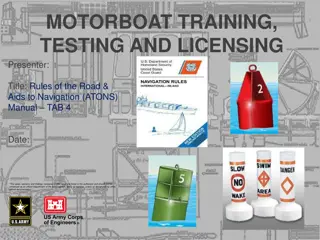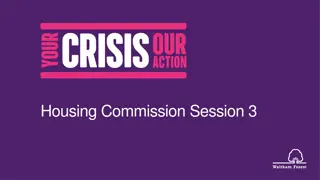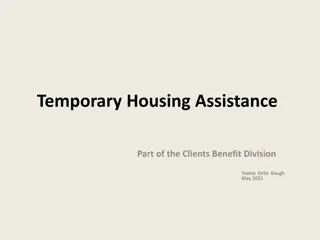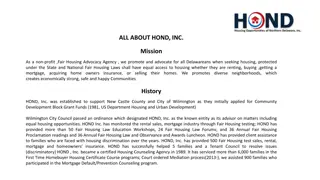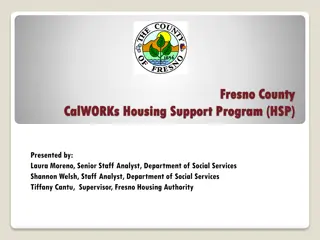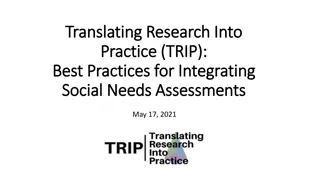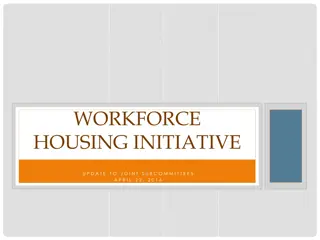Patient Navigation Conference Series: Housing and Patient Support Strategies
Welcome to the Patient Navigation Conference Series! In this webinar, we will discuss essential tips for patient support and housing strategies. Topics include realistic expectations for newly housed individuals, small steps towards stable housing, and post-housing checking-in procedures. Join us for valuable insights and guidance on supporting patients through their housing journeys.
Download Presentation

Please find below an Image/Link to download the presentation.
The content on the website is provided AS IS for your information and personal use only. It may not be sold, licensed, or shared on other websites without obtaining consent from the author. Download presentation by click this link. If you encounter any issues during the download, it is possible that the publisher has removed the file from their server.
E N D
Presentation Transcript
Patient Navigation Conference Series Welcome and thank you for joining us! Here are some tips that may be helpful during the webinar today: Please make sure to click the volume icon (it should be grey) to mute your speakers. On your phone, dial 866-715-6499. Enter passcode: 996-860- 6215, then press #. All lines are currently muted. To speak, please unmute your line by dialing *6 on your phone. You can re-mute your line by dialing *6 as well.
Announcements Launch of bi-weekly discussion questions on e-Forum at www.medheart.hdwg.org Next Patient Navigation webinar: June 18, 2014 @ 12pm ET, 11am CT, 9am PT
Housing Part 2: Youre Housed, Now What? JAMES APT, CASE MANAGER BOSTON HEALTH CARE FOR THE HOMELESS PROGRAM MAY 21, 2014
Review: Realistic Expectations Get the patient thinking about what their day-to-day life will be like once they're housed. Reinforce the importance of "structure" in daily life. There may be "triggers" for anxiety, for stress and for relapse in your new life as a housed person. Life has it's challenging moments. Ask patient: what helps keep you sane? Record answer and help patient troubleshoot difficult situations ahead of time. Discuss the pros and cons of using a payee service?
Review: Its About the Small Steps Encourage the patient to think of housing in units of 1 year or 30 days, depending on the terms of the lease. Encourage the patient to think of good housing as a stepping stone to great housing. Don't be afraid to admit (temporary) defeat. Preserve housing options at all costs! Don't personalize rejection. Housing is about $$$. Collect: letters of support from service providers, associates and community members can be useful.
Checking-in After Being Housed After they re housed, compare and contrast their impressions of being housed If possible make a list of good and less good things about current housing Alternatively create a Done List or a To Do List Think of housing not as a finish line , but as a new chapter
Structure is Key Encourage your newly housed patients to think in blocks of 365 days. Map out with a patient what a typical day and week might look like for them Are there any patterns? Supply client with bus or subway maps and routes Discuss the following topics: Utilities shutoff protection Food stamps and food resources in the area Mail delivery Day programs or drop-in centers in the area Libraries and other public resources Financial obligations Rent Food Utilities Cable Cell phone Non-essential essentials
How can being housed affect staying in care? Better: Close to care, housing adds stability , home visits more frequent Worse: Poor location, transportation issues, isolation
Acquiring housing can be exhausting Acknowledge to the patient that it s fine to take a quick breather but then it s time to set new goals! New goals can be Housing goals Non-housing goals Both Be patient centered what would you like to work on next?
Change in household composition Situations that affect household composition Getting married or divorced Having children Reuniting with family Is it a cause for reasonable accommodation ?
Dating while housed Negotiating health relationships AND retaining housing Housing involves landlords, and usually neighbors Discuss the safety rules for dating Rules for both physical, social, and emotional safety but also housing retention safety
Avoiding unwanted guests What are some reasons people invite guests into their home? Moving from a shelter to housing is a BIG thing and can bring up conflicting emotions Social isolation is sometimes a problem
Other visitors Patients may invite outside guests into their home because of loneliness or pressure from shelter or other homeless folks May serve as triggers to relapse or overdose if applicable discuss and offer Narcan with instructions How do you balance helping your patients feel relaxed vs encouraging them to guard themselves from danger?
Dealing with difficult neighbors and stressful situations at home Number 1 Rule: this is YOUR housing! Brainstorm with patient some key way to avert problems with neighbors
What about pets? Review lease to see whether this is allowed If not, you may try obtaining a letter from the patient s doctor outlining a medical necessity for a pet Pets are good companions and alleviate anxiety and loneliness but can be a big responsibility Review what s required, physically and emotionally to take care of a pet Are there organizations in the area that help to pay for pet food? Care? Supplies?
Tips and Tools Journaling Track how a patient is feeling over time Are there times of the day, week, or month that are more stressful? Look for patterns and work with patient on solutions both short and long term List of important and/or emergency numbers Place in a convenient location Update regularly with patient Reminder of upcoming appointments Sample tools on the Med-HEART website



